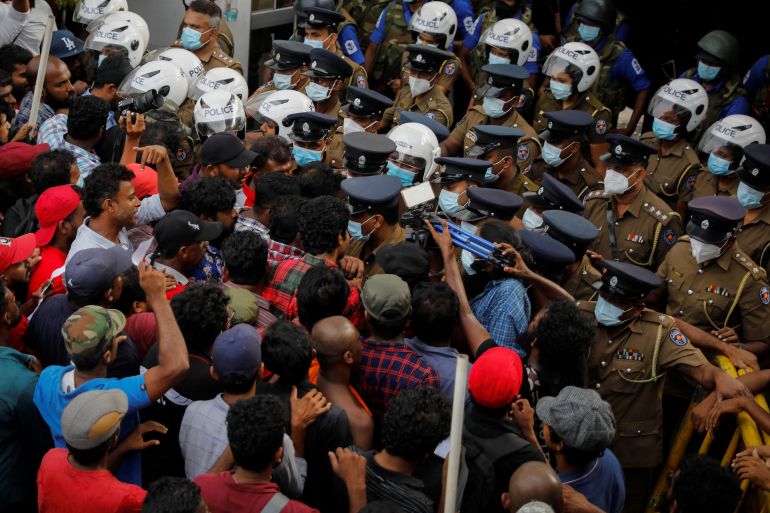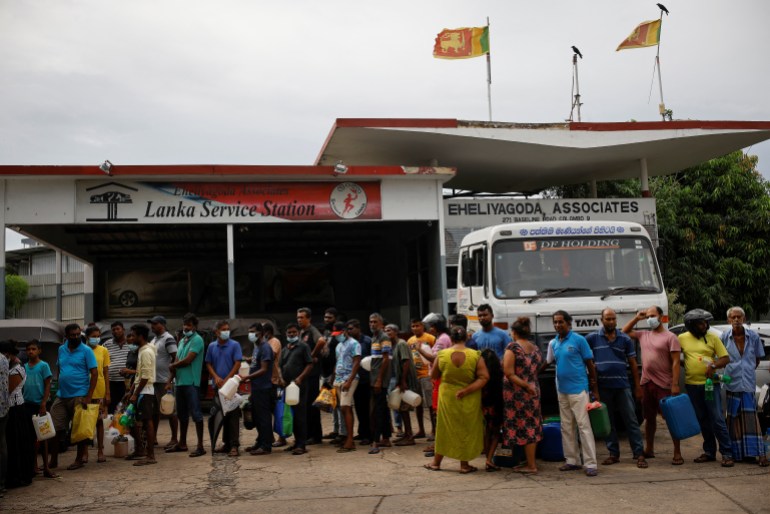Sri Lanka parliament reconvenes as PM warns of critical shortages
Parliament meets for the first time since last week’s violence that saw Mahinda Rajapaksa resign as the prime minister.

Sri Lanka’s parliament has reconvened for the first time since violence flared last week and the prime minister quit, a day after the new prime minister warned that the country is in a precarious economic state and down to its last day of petrol supplies.
Ranil Wickremesinghe, the new prime minister, said in a televised address on Monday that the island nation has to face “unpleasant and terrifying facts”.
Keep reading
list of 4 itemsSri Lanka mulls privatizing national airline amid crisis
Crisis-hit Sri Lanka down to its last day of petrol, warns new PM
The ‘new’ PM will not be a panacea to Sri Lanka’s problems
“At the moment, we only have petrol stocks for a single day. The next couple of months will be the most difficult ones of our lives,” he said.
Foreign reserves had neared zero, from $7.5bn in November 2019, with the country requiring $75m in the next few days to keep the economy running, he added. Essential medicines had run out.

Power cuts could extend to as long as 15 hours a day because of the lack of fuel, which is mostly imported.
Wickremesinghe said he planned to ask for foreign assistance, privatise SriLankan Airlines and seek parliamentary approval to increase Treasury bill issuance to 4 trillion rupees ($11.27bn) from 3 trillion.
“For a short period, our future will be even more difficult than the tough times that we have passed,” he said.
More than a month of predominantly peaceful protests against the government’s handling of the economy turned deadly last week when supporters of former Prime Minister Mahinda Rajapaksa stormed an anti-government protest site in the commercial capital, Colombo.
Days of subsequent clashes between protesters, government supporters and police left nine people dead and more than 300 injured.
Rajapaksa then resigned, leaving his younger brother Gotabaya Rajapaksa to rule on as president.
Sri Lanka’s economic crisis, unparalleled since its independence in 1948, has come from the confluence of the COVID-19 pandemic, rising oil prices and populist tax cuts by the Rajapaksas.
The chronic foreign exchange shortage has led to rampant inflation and shortages of medicine, fuel and other essentials, bringing thousands out on the streets in protest.
Wickremesinghe’s four cabinet appointments to date have all been from the Rajapaksas’ Sri Lanka Podujana Peramuna party, much to the dismay of protesters, who want to exile the family from the nation’s politics.
He is yet to announce key portfolios, including the crucial post of finance minister, who will negotiate with the International Monetary Fund for financial help.
Former finance minister Ali Sabry had held preliminary talks with the multilateral lender, but he quit along with Mahinda Rajapaksa last week.